It is known as the Garden of England and has for generations provided a bountiful, water-intensive apple crop.
But this summer, Kent has become a poster child for Britain and Europe's developing drought crisis.
With a recent EU report showing nearly half of Europe is exposed to drought, parts of England have had their driest July since records began almost 200 years ago.
The agency that charts the situation has shown almost 15 per cent of the continent is under Red Alert drought conditions and the situation is forecast to worsen during the month.
That has prompted the European Commission to urge EU member states to reuse water from urban wastewater treatment plants for crops.
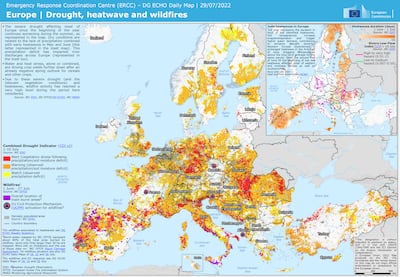
While southern Europe is accustomed to searing heat and dry conditions, France and the UK are typically more humid. Yet for both countries, July brought record rain shortfalls.
Average precipitation was 9.7 millimetres in France, a shortfall of 85 per cent and the driest July in the country since 1959, the French weather agency Meteo France said.
In England, it was the driest July since 1935 with average precipitation at 23.1mm, while South-East and central southern England had an average of only 5mm of rain, and adjacent East Anglia had 5.4mm, provisional figures from the UK's Met Office show.
UK drought — in pictures
Many water companies are considering hosepipe and sprinkler bans.
South East Water, in particular, will be hoping to avoid the sort of catastrophe that befell a small village under its jurisdiction in July.
For six days, the 850-plus residents of Challock in Kent were left without drinking water after the provider simply stopped providing, with reservoirs in the county running perilously low.
South East Water sought to shift the blame on to the excessive water consumption of people in the area during the UK's record-breaking heatwave, which temperatures topped 40°C on July 19.
Rachel Riley, head of Challock preschool, which was forced to close by the water cut, is far from certain this version of events stacks up.
“I was told [by South East Water] it was because of the heatwave, but the heatwave we experienced [when temperatures were] very high was on Monday and Tuesday,” Ms Riley told The National.
“We lost our water on the Saturday prior, so I don't think it was strictly true.”
She said there had been no prior warning of the cut.
The ramifications were borne by the entire village, personally and professionally, but few were quite so “disastrously affected” as Ms Riley.
“I had to close up the preschool because I had no running water and legally I can't open if I've got no flushing toilets,” she said.
The closure meant she could not charge families or pay staff.
Even more serious, Ms Riley has a daughter with a medical condition that requires mixing supplements with water at least two to three times a day.
Despite the pressing need, and her seven-strong household, she was given only six bottles of water by South East Water.
“It was very difficult, very hard, very emotional and very tiring,” Ms Riley said, recalling her dashes around the area looking for alternative sources of water.
Europe's farmers feeling the heat
Domestic users have not been the only ones affected by the UK's dry conditions. Farmers have also been alarmed.
“The impacts of this prolonged spell of dry weather are hugely challenging for many farms across the country and causing concern for all farming sectors,” National Farming Union president Tom Bradshaw told The National.
“The lack of rain means crops such as sugar beet and maize are showing signs of stress, while there are challenges for farmers needing to irrigate field veg and potatoes.
“The dry weather has also severely hampered grass growth, which could hit feed supplies for the winter, adding additional costs to livestock farming businesses at a time when costs are continuing to increase significantly.”
The UK's agricultural challenges are replicated throughout Europe, with corn crops shrivelling in the heat and olives hard to find.
Corn is sown in spring and the heat and lack of rainfall has blighted its growth, with farmers in some parts of Europe at risk of losing their entire crop.
“Last weekend, I saw fields where the corn was just above my knees,” said Helmut Messner of the German corn growers' committee.
“It's partially already brown so there is no photosynthesis, because the leaves are already dead. Usually at this time of year it's 2.5 to 3 metres tall.”
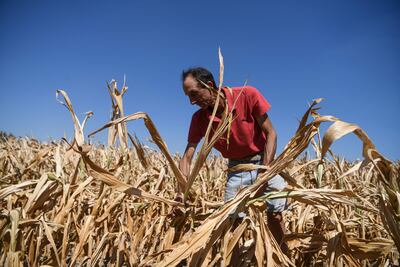
Farmers in southern Spain fear extreme drought and consecutive heatwaves this year could cut olive oil output in the world's largest producer by nearly a third in the 2022-2023 season.
An association of young farmers in the main olive-growing region of Andalusia estimated that Spain would produce about 1 million tonnes of olive oil, down from 1.48 million tonnes pressed in the 2021-2022 harvest, according to the latest official data from May.
French prime minister
Italian farmers are equally pessimistic over the outlook. “We expect a poor season in terms of quantity of olive oil production,” said Tuscan oil grower Filippo Legnaioli. “Unfortunately, climatic issues had a decisive influence. We had a very dry spring with practically no rainfall.
“And this happened at a crucial time during the transition from flower to fruit. We had an excellent flower but the lack of water hindered the process.”
Mr Bradshaw said the situation highlighted “the urgent need for government and its agencies to better plan for and manage water resources”.
Farmers in the UK have at least been receiving some assistance with the current drought.
“The Environment Agency has launched measures to support flexible abstraction and this will potentially give some farmers the ability to trade volumes of water with other farmers,” Mr Bradshaw said.
UK must adapt to National Water Resources framework
Thinking about water management is the life work of Ian Holman, Cranfield University's Professor of Integrated Land and Water Management.
Prof Holman believes people in Britain and Europe are facing a long-term challenge in which utility companies will be at the frontline of the crisis.
“The National Water Resources framework is quite clear that, if we do nothing, there will be challenges of meeting water demands,” he said.
“And that's why there are regional groups linked to the water companies doing more detailed regional assessments.
“We're not in a situation where doing nothing is a sustainable solution. But there is a roadmap laid down for how to deliver the resilience that we need to meet these future pressures.”
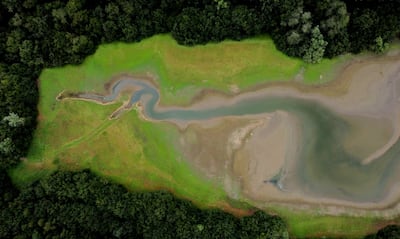
Prof Holman says infrastructural improvements are needed but consumers' behaviour must also change or hosepipe bans and water cuts will be common.
He is clear that managing the UK's water supply, whether in private or public hands, in the years to come will require adaption.
The UK is systemically unequipped to cope with a greater incidence of drought.
“The National Water Resources framework recognises that there are water supply challenges facing the country from climate change, from growing population and from the need to protect the environment,” Prof Holman said.
Foremost among these challenges is leak reduction, which he said has been a years-long endeavour and one shared by many other countries with older pipelines.
“It's long been recognised that there is leakage from the mains water distribution system, and the public water supply companies have been investing in leakage control for many decades now,” Prof Holman said.
“It's an ongoing challenge … it's recognised that leakage rates need to come down further than they have to date.”
Campaign group We Own It told The National that privatised water companies lose billions of litres of water every day because of leaks.
The group accused Bristol Water, Northumbrian Water and Severn Trent of wasting 7,500 litres of water every second.
But Prof Holman said infrastructural improvements had been made, particularly in relation to water portability.
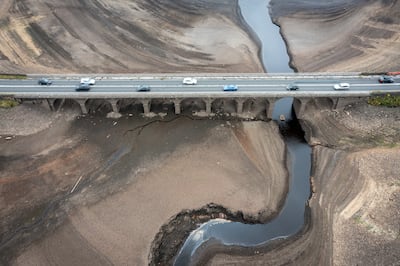
“There's been significant investment in the interconnection of the water supply networks,” he said. “The water can be moved from where it's available to where it's needed.
“One of the reasons the water supply companies and environmental regulator are moving towards declaring a drought is that the needs are not just human, they're also environmental.
“Even during drought, we want to maintain healthy river ecosystems. We don't want to destroy them through over-abstracting water.”
From 'Mains to Rains' and damping expectations
And while corporations must bear part of the responsibility for water management in the future, Prof Holman said the public had a big role to play too.
“People must be made aware that water isn't an infinite resource and that we have to use it carefully … people should think about their water use habits.”
“We can't have a situation where people can expect to always be able to get an unlimited amount of water.”
As part of this educative drive, Prof Holman and his team at Cranfield have been working with the Royal Horticultural Society to encourage gardeners to make better use of rainwater rather than relying on mains water.
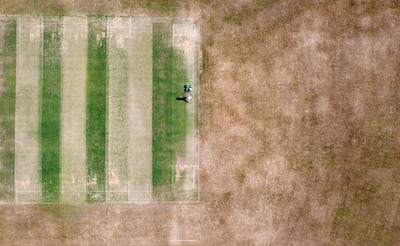
One practical tip for gardeners is to use a watering can rather than a hosepipe to water plants. Lawns should remain unwatered in summer months.
Other useful tips in the “Mains to Rains” campaign include installing water buckets to capture rainfall for later use; not to use concrete in front gardens but surfaces that let rain fall through, so that it doesn't just run off into the drains and out to sea; and putting a saucer under pots to capture any water that drains through.









